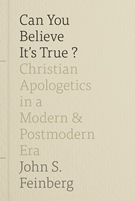About the Author
John S. Feinberg (PhD, University of Chicago) is professor of biblical and systematic theology at Trinity Evangelical Divinity School and has been teaching apologetics at the graduate level for more than 30 years. He is general editor of Crossway’s Foundations of Evangelical Theology series and author of Ethics for a Brave New World (with Paul D. Feinberg), No One Like Him: The Doctrine of God, and The Many Faces of Evil.
Overview
Defending the Christian faith, amongst other things, requires responding to the particular concerns of individual challengers. Today some people try to operate with an Enlightenment epistemological ideal, while others have rejected modernism and argue for epistemological skepticism and relativism. Apologists not only need to refute objections to the faith and offer positive evidence for it, they also need to justify making knowledge claims in the first place.
In Can You Believe It’s True? Christian Apologetics in a Modern & Postmodern Era Feinberg examines the different tactics needed to engage modern and postmodern thought. He then summarizes and critiques the three main methodological approaches in Christian apologetics (Reformed epistemology, presuppositionalism, and Christian evidentialism). Finally, Feinberg illustrates how his favored methodology works by discussing four representative apologetic issues (the problem of evil, the reliability of the Gospels, the resurrection of Jesus Christ, and religious pluralism). His overarching argument is that Christianity is true, it is eminently defensible, and we can know—not merely believe—that it is true.
Table of Contents
Part One
1 Introduction
2 Modernity and Postmodernity
3 Answers to Postmodern Skepticism (I)
4 Answers to Postmodern Skepticism (II): Objectivity, Subjectivity, and Apologetics
5 Answers to Modern Skepticism (I)
6 Answers to Modern Skepticism (II): Doubt and Certainty
Part Two
7 Reformed Epistemology
8 Presuppositionalism
9 Christian Evidentialism
Part Three
10 The Problem of Evil
11 The Reliability of the Gospels
12 The Resurrection of Jesus Christ
13 Religious Pluralism
Summary
Chapters 1 & 2
Introduction/Modernity and Postmodernity
In contemporary Western society, Christians face intellectual challenges from both modern evidential epistemology and postmodern epistemological skepticism. Modern philosophers insist that a proposition is only to be accepted on the basis of sufficient evidence, whereas postmodern philosophers argue that all knowledge claims are really relativistic human constructs. The former links knowledge with evidence and the processes of reason while the latter denies that human beliefs can be justified enough to constitute knowledge: instead, beliefs are opinions or perspectives. Postmodern relativism is increasingly common and still exercises a formidable influence in academia. To illustrate the differences between modern and postmodern challenges, Feinberg presents …
[To continue reading this summary, please see below....]The remainder of this article is premium content. Become a member to continue reading.
Already have an account? Sign In
Buy the books

Can You Believe It's True? Apologetics In A Modern And Postmodern Era